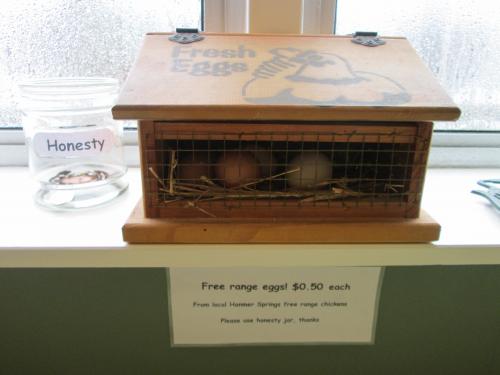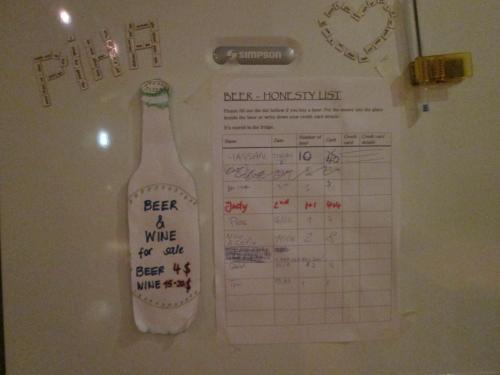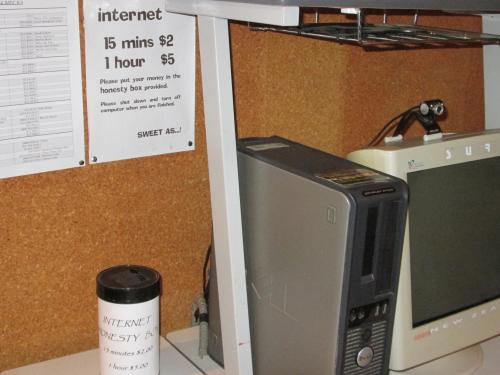At the tender young age of 5, I became a thief. My loot was a box of new Crayola markers; the scene of the crime was Sunday School. Yes, after learning about The Good News (still not sure what that really meant) I spied markers in my assigned desk. And I stole them. A short ten minutes later, I was busted, and received my shameful lesson in not taking something that doesn't belong to you. I can't remember ever stealing anything again, except perhaps several 'free cookies to kids under 12' at the grocery store, long after I turned 12. Hey, a babyface has to be good for something.
Churches and grocery stores aren't the only victims of theft. Hostels can be targets for thieves who see tourists as walking ATMs or simply opportunistic places to strike. Most hostels are good about weeding these dodgy people out at the door, but what about the less obvious potential thief: your typical backpacker? There is always a chance you may have problems with guests, including petty theft, but unless you are going for some weird experiment in experiencing hostility, you don't want to run a place that feels like an offshoot of a fascist dictatorship. Having a balanced atmosphere- one that keeps control but also peace- is key.
Tangible items like bean bags, hammocks or warm lighting can add relaxation to a hostel atmosphere, but will be pointless without systems that also allow that attitude to shine through. For example, checkout time. Most hostels have a strict check out time simply for logistics, often using a forfeited key deposit as a deterrent from 3 hour-late checkouts. Even that hungover guy will drag himself out of bed on time lest he lose the 10 or 20 bucks that could go for the next round tonight. You know, the one he will buy 4 hours after saying 'I'm never drinking again'. Yea, that guy. Once in awhile, though, someone is bound to ask you for a late checkout. Maybe even more than once in awhile. While it can be a slippery slope to bend the rules, doing so from time to time can really keep your guests happy, your atmosphere lighthearted and still allow you to keep things running smoothly.
If you doubt that gestures like these make a difference for atmosphere, don't forget that guests are often like small children- they hear everything. You may think you are only dealing with one guest at reception, but the others nearby are bound to overhear their fellow traveler slightly begging for a late check out because they don't feel well. And, therefore, will also hear your empathetic 'Sure, just this once, we're cool with that. Hope you feel better!' answer.
One system in particular is a favorite of mine for setting a relaxed hostel atmosphere: the honesty system. Yes, it can seem a bit counterintuitive with the crowd we're dealing with. Set up a payment system based on honesty with a group of people known for being broke, squeezing resources, and even petty theft (toilet paper and teaspoons, anyone)? Yes, really. Why? Well, a few reasons. One, it can work. Two, it can make operations easier for staff. Three, it sends out a good vibe.
I stayed recently at Piha Beachstay outside of Auckland. A small, beautiful hostel with only 14 beds but an uber chill atmosphere. From laundry to beer to internet, nearly everything at this hostel was on the honesty system. It was one of the first things I noticed, after the beautiful house itself. I asked Geoff, the owner, about using the system. He said he didn't keep strict numbers on anything, but that for their small place it worked really well and most people paid. I found it was also a great example of mirroring the atmosphere of the place. It placed trust in the guests, encouraged a no-worries attitude, and elicited respect back to the hostel both in payment and treatment of facilities.
While the Beachstay may be an extreme example of using the honesty system, I have seen it used in smaller forms in other hostels as well. For instance, a few hostels have had egg baskets with a jar for the 50 cents cost. Not only is it incredibly convenient for your guests, it adds a nice touch of atmosphere and can be a little extra cash for the month. Yes, you could actually earn money off an honesty system. Many hostels have.

Eggs for everyone at Jack in the Green in Hanmer Springs, NZ
When I started thinking about honesty systems in hostels, and wondering if they could really work, my mind immediately jumped back to reading the book Freakanomics. For those of you who haven't read it, one of the chapters deals with "The Bagel Man" named Paul F. Previously at a corporate job where he brought in bagels once a week for the staff, Paul eventually quit to sell bagels full time. The twist was that his business was completely set up on honesty. Would it work? Luckily being a former economist, Paul had statistics and data on just about everything.
His business was simple: set out a basket of bagels, a $1 per bagel sign, and a money box. At his original office, the pay rate was 95%. He assumed this would be the case once he took his business to other corporate offices, but found that payment 'on the street' was lower. The average was around 89%. Why? Most likely because his customers had personal knowledge of him, which deterred theft. Much psychological and economic research shows people will pay different amounts for the same product simply based on who is providing it. This is where hostels would benefit with an honesty system. Being places of community and interaction, the manager and staff often get to know guests. (Smaller hostels would clearly be of much higher benefit in this regard, but even larger ones could use this to their benefit. )

This one may be tricky...honesty beer? Can it work?! Seems to, at least at Piha Beachstay
Who else paid well? Paul found (intuitively) that offices where people really liked their work or their boss had high pay rates, and (statistically supported) smaller offices did as well. Put this into the context of a hostel and there is definitely potential for a successful honesty system. Staff working at a hostel generally love their job. While they may not be your main customers, their enthusiasm is bound to rub off on your guests, and perhaps could have the same effect. Backpackers who have strong positive feelings towards a particular hostel may not feel so inclined to screw that place over.
Of course, being a smaller business to begin with is a major factor of success with honesty systems. Paul found that an office with a few dozen employees generally outpays an office with a few hundred by 3 to 5 percent. It follows logically that a smaller hostel would do better with an honesty system. The staff will likely know guests better, therefore utilizing the personal-knowledge theft deterrent, and a smaller hostel will also have the rural vs. urban benefit. Just like street crime tends to be lower in rural areas, so would theft from an honesty system be lower in a smaller hostel.
Even though in a larger hostel there is more of a chance of being seen, in a small hostel there is more of a chance of being known. And thus, a smaller hostel would have stronger social incentives against theft, such as shame. It's along the same reasoning that knowing your guests and encouraging interaction among them can be a security measure. It can deter problems like theft of belongings, as people are less likely to steel from those they know or from an environment where they don't feel anonymous.
There are certainly places where honesty systems wouldn't work. Namely, big hostels where the risk for theft or being taken advantage of would be too great. I also stayed recently at Downtown Backpackers in Wellington. I really enjoyed my stay, even though it was quite larger than many of the hostels I've been staying at and more used to. In addition to several floors of rooms, the hostel also had a large cafe/restaurant and full attached bar. It's easy to understand why 'Grab a beer and throw $2 in the tin' wouldn't work there. This was further confirmed to me by signs I saw advertising hair dryers available for a $50 deposit and towels for a $10 deposit. Perhaps those deposits seem a bit harsh, but I'd venture to say they were done out of necessity and experience for their particular situation.
Paul has been running his honesty-based bagel business for 20 years now. During a discussion with friends over the idea that people can not be trusted, Paul posed a story about a student challenging Socrates' teaching about honesty and justice. Socrates argued that people will not be dishonest if given the chance. Rather, they are good even without enforcement. This can be argued back and forth for days but Paul sided with Socrates saying that 89% of the time (his average pay rate), people are good on their own. While a hostel could be taking a hit losing 5-11% of its rightful income, perhaps the payoff in a relaxed atmosphere and less work for staff is worth it. And who knows, even the cheapest of backpackers may still be honest, as expressed in a half-joking comment I overheard at a hostel recently: "Aww an honesty system? I hate those…they always guilt me into actually paying!" Job well done.
What are your experiences with honesty systems? What types of products do you offer with them, and for what size hostel? Do you think they make a difference in atmosphere? Sign in and comment below.
**I know many of you comment on these blogs on the site's FB page, which is great, but it would be even better to have the comments directly on here for everyone to read. Thanks for your input and helping to further our knowledge!**
Keep following along:
<< My previous post: Freebies & Discounts: Music to a Backpacker's Broke Ears
>> My next post: Taking On the Low Season Blues, Part 1: Guest Inclusion
Just joining the show and don't know who I am? Check out my introductory blog post.
As always, send any suggestions, questions, or thoughts on the blog my way: [email protected].
Peace & love,
Courtney
P.S. Don't miss out! Follow HostelManagement on Twitter if you would like to receive updates when new my blog posts are made.


